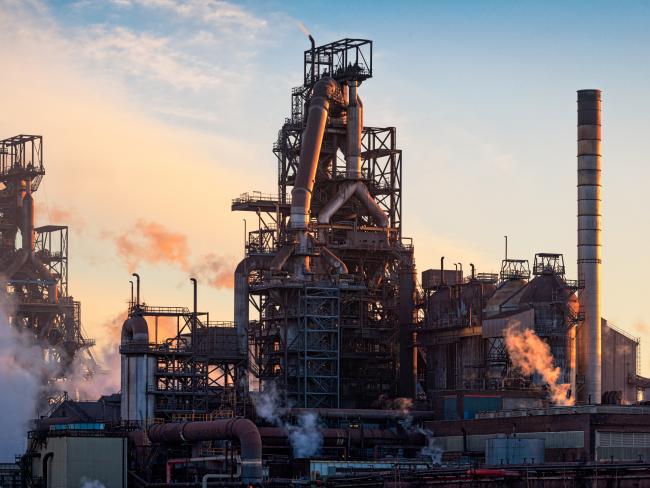24 January 2024

Port Talbot steelworks, Britain’s largest, is under threat from net zero plans. Photo Chris Goddard/Shutterstock.
Tata Steel has announced it will cut up to 2,800 jobs in Britain, the majority of them at Britain’s biggest steelworks in Port Talbot, South Wales. The company says that 2,500 of these job losses will be in the next 18 months with 300 jobs going later.
The closure of blast furnaces at Port Talbot is driven by net zero policy. Tata says it will replace them with electric arc furnaces to cut emissions. And the government has committed £500 million of taxpayers’ money to Tata.
Shutting down
The first blast furnace will close around the middle of this year with further changes towards the end of the year. Currently the plan entails shutting down the blast furnaces before electric arc production is onstream.
Describing the use of blast furnaces as the single biggest carbon dioxide emitter must be seen in context. The change to electric arc furnaces will only reduce Britain’s carbon emissions by around 1.5 per cent.
Wider impact
The claimed 85 per cent reduction in the overall carbon emissions from steelmaking will have a small overall impact on emissions. But the move will have wider impact on industry and the economy.
This decision isn’t only about reduced emissions, it’s also about the future of steelmaking in Britain. If we become more reliant on virgin steel imports, then we lose a strategic asset.
‘Britain would be the only G20 country not producing virgin steel.’
The change to electric arc furnaces using scrap steel would make Britain the only G20 country not producing virgin steel. That vital industrial material would have to be imported.
Tata says that almost all raw materials for the current blast furnaces have to be imported. That is disingenuous and a poor attempt to justify electric arc furnaces. And coking coal for blast furnaces should not need to be imported anyway.
Indifference
Woodhouse Colliery in Cumbria could supply coking coal, but plans have been stalled by government indifference and environmentalist opposition. The delayed High Court hearing after the government changed its mind on going ahead is expected this March.
Tata says is would use British scrap steel for the proposed electric arc furnaces at Port Talbot. But there is no guarantee: imported scrap steel could be used as well as, or even instead of, British scrap steel.
Other industries
Tata’s plans will directly hit other industries. For example it is not technologically possible to use electric arc furnaces to supply steel for tinplate used in cans.
Switching to an electric arc furnace-only model could mean the closure of the Trostre tinplate works in Llanelli at a cost of more than 700 jobs and thousands more downstream. And tinplate would then be imported.
And it is not possible to make some high-end automotive steels using electric arc furnaces. That again threatens jobs, particularly at the Llanwern works. A red line for the steel trade unions has always been that the future for all downstream plants must be secured as part of any transition.
TU plan
Under a union plan (endorsed by Community and GMB) one blast furnace would continue to run until the end of its life-cycle in 2032, while one small electric arc furnace and later a second electric arc furnace or open slag bath Furnace are constructed.
The plan also recommends the construction of a direct iron reduction plant to fully decarbonise steelmaking and to ensure that Britain retains its strategically important capability to produce virgin steel. Tata rejected this plan.
Unite, the third trade union in the industry, has also set out plans for the future. It takes a different view on the best course of action. But as Tata and the government are accepting neither plan, those union differences need to be resolved soon.
Energy prices
Steel manufacturing in Britain has become uncompetitive because of high electricity prices, which successive governments have refused to address. The industry has been paying between 60 and 80 per cent more than its counterparts in France or Germany. And moving to electric arc furnaces does not address that problem.
Labour leader Keir Starmer said, “The government said it had a plan for steel. It transpires the plan involves thousands of redundancies.” He is right about that but he doesn’t have an answer since the Labour Party is equally committed to net zero policies.
